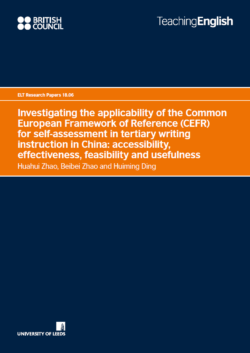Project report

The current project investigated the accessibility, feasibility, effectiveness and usefulness of the Common European Framework of Reference for Languages (CEFR) and its companion European Language Portfolio (ELP) descriptors for tertiary writing instruction in China to explore how the CEFR could be used to bridge teaching, learning and assessment.
The project was conducted in three phases, involving two writing tutors and 146 students from three subjects in a university in China. In the pre-assessment phase, participants’ perceptions of the original ELP descriptors were sought and used as the basis for modifying the descriptors for self- and teacher assessment. In the assessment phase, learners’ self-assessment ratings were compared with teacher assessment ratings. In the post-assessment phase, participants’ perceptions of the accessibility, feasibility and usefulness were explored.
The qualitative analysis of pre-assessment perception data revealed learners’ difficulties in understanding the original ELP descriptors and therefore bilingual versions with a reduced number of technical words were developed. The quantitative analyses revealed that more than half of the students gave the same ratings as their tutors. However, students tended to assess their writing proficiency at a significantly higher level than their teachers did, suggesting students’ over-estimation of their writing proficiency. The post-assessment survey suggested that students and tutors highly valued the roles of the self-assessment descriptors in raising their awareness of writing weaknesses, setting learning objectives for next assignments and developing their understanding of effective writing. The project substantiated the importance of eliciting learner voices and contextualising the CEFR in local contexts. It also provides important implications for using China’s Standards of English Language Ability for teaching and learning.
Click here to download the report.
